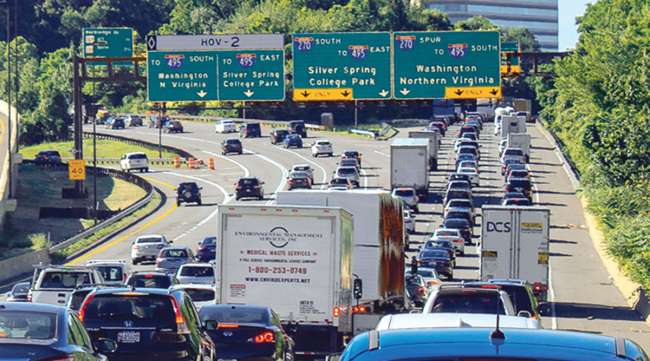Trucks and other vehicular traffic in Maryland. (Maryland DOT via Flickr)
Maryland and Massachusetts have temporarily scuttled enforcing their California-based heavy truck emissions laws in deference to manufacturer difficulties amid the Trump administration’s tariffs and electric vehicle funding pulls.
Maryland Gov. Wes Moore cited the activities of President Donald Trump’s administration to rescind Biden-era EV policies among motivations for the April 4 issuance of Maryland Executive Order No. 01.01.2025.10: “Ensuring Success with Advanced Clean Cars II and Advanced Clean Trucks in Maryland.”
Moore’s four-page order stated: “The current federal administration has held back state funding for the National Electric Vehicle Infrastructure Program; and the Moore-[Lt. Gov. Aruna] Miller administration remains committed to successful implementation of the state’s clean car and truck programs but recognizes that temporary short-term measures are necessary to ensure the programs’ long-term success, including maximizing near-term enforcement discretion to ease compliance by OEMs and establishing a working group to study and make recommendations on how the ACC II and ACT programs can be successfully implemented in Maryland.”

Moore
Moore was referring to Maryland’s adoption of California’s Advanced Clean Cars II regulations — which reduces model year 2026 light-duty passenger car, pickup truck and SUV emissions — and its Advanced Clean Trucks regulation — which forces manufacturers of medium- and heavy-duty vehicles to sell more zero-emission vehicles until eventually outlawing by 2036 their ability to sell/make new traditional diesel vehicles in the state.
Moore’s order noted OEMs have voiced concerns in Maryland about difficulties fulfilling ZEV requirements and “there are indications that the policies of the current federal administration will greatly impact ACC II and ACT compliance, including the effect of trade tariffs on manufacturers.”
Moore mandated that the Maryland Department of the Environment work with OEMs to ease regulatory burdens regarding the adopted California emissions regulations.

Campion
“Maryland Motor Truck Association appreciates Governor Moore’s executive order to prevent any fines or penalties against the manufacturers for failure to meet the sales percentages in the Advanced Clean Trucks rule,” MMTA President and CEO Louis Campion said. “We continue to work with the state on completion of the needs assessment that was required when the ACT originally passed so we can identify and overcome the hurdles that must be addressed before widespread adoption of electric trucks is feasible.”
Under the order, Maryland:
- Won’t seek ACT-related penalties for delivery or sales shortfalls of model year 2027 ZEVs, and won’t pursue penalties for delivery or sales shortfalls of model year 2028 ZEVs unless the state publishes by Dec. 1 the needs assessment plan.
- Won’t pursue ACC II penalties for model years 2027-2028 ZEV delivery shortfalls unless the state is engaged in voluntary agreements with OEMs having a combined 40% state market share of passenger cars and light trucks.
- Will use discretion to decline enforcing ACT and ACC II requirements for ZEV delivery shortfalls for model years 2027-2028.
“The governor’s approach tying future delays to the completion of and findings in the needs assessment will allow for continued progression of the program in the state, without the fear of fines or inventory restrictions, as the infrastructure and market for zero-emission trucks continues to develop,” Campion said.
Moore ordered the formation of a “Maryland ACC II and ACT Working Group,” with at least 15 members including three state departmental representatives, the chief sustainability officer, a member of each legislative chamber and governor-appointed representatives of MATA, the Maryland Automobile Dealers Association and three environmental groups.

Traffic on the Boston Zakim bridge in Bunker Hill, Mass. (LUNAMARINA/Getty Images)
Meanwhile, the Massachusetts Department of Environmental Protection on April 14 issued a similar measure delaying its implementation of California’s regulations. The state’s truckers, led by the Trucking Association of Massachusetts had been among state legislators and business leaders asking Gov. Maura Healey for relief from this year’s implementation of the state’s ACT rule.

Healey
Now, MassDEP announced it will apply “enforcement discretion” for manufacturers unable to meet required minimum electric truck sales required under the ACT program. “Manufacturers that cannot meet those sales requirements will receive relief for model years 2025 and 2026, provided they make internal combustion engine trucks available to distributors seeking them. This approach gives manufacturers more flexibility and eases the challenges dealers are facing while keeping the state on track to achieve critically important emissions reductions,” MassDEP noted.
MassDEP reaffirmed the state’s commitment to ACT and vehicle electrification. It noted that “manufacturers must continue investing in their manufacturing and distribution networks to ensure a smooth transition to electric trucks” while making internal combustion engine trucks available to dealers.

Weeks
TAM Executive Director Kevin Weeks reacted positively to the change. He said TAM looks forward to collaborating with its stakeholder groups, manufacturers and the governor’s administration to continue lowering transportation emissions.
“Our hope is that going forward, today’s DEP decision encourages all stakeholders to work together to develop practical and attainable strategies for working toward the additional reduction of emissions from the transportation sector,” Weeks said. “Given the current lack of necessary technology and infrastructure to support a transition to medium- and heavy-duty electric trucks in Massachusetts, the ACT rule, as it is implemented, has hindered emissions-reduction efforts and impeded the ability of our private and public sectors to acquire the trucks they require.”






